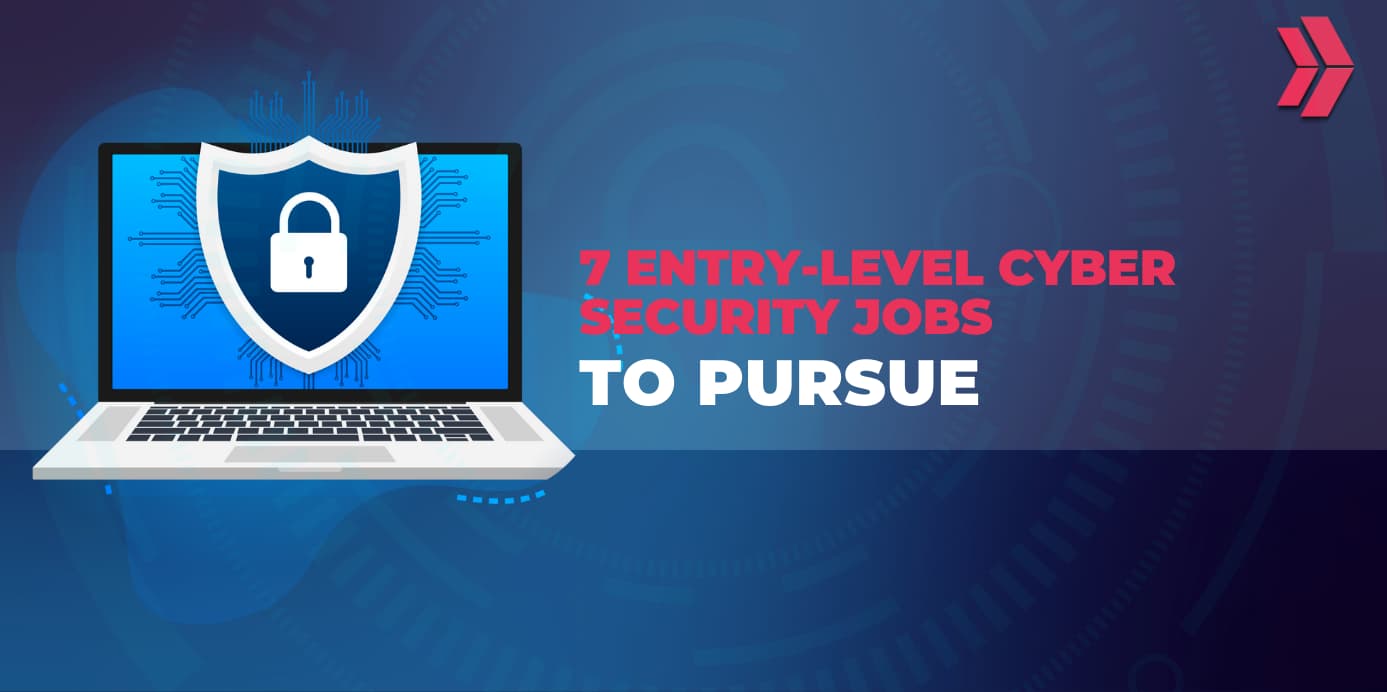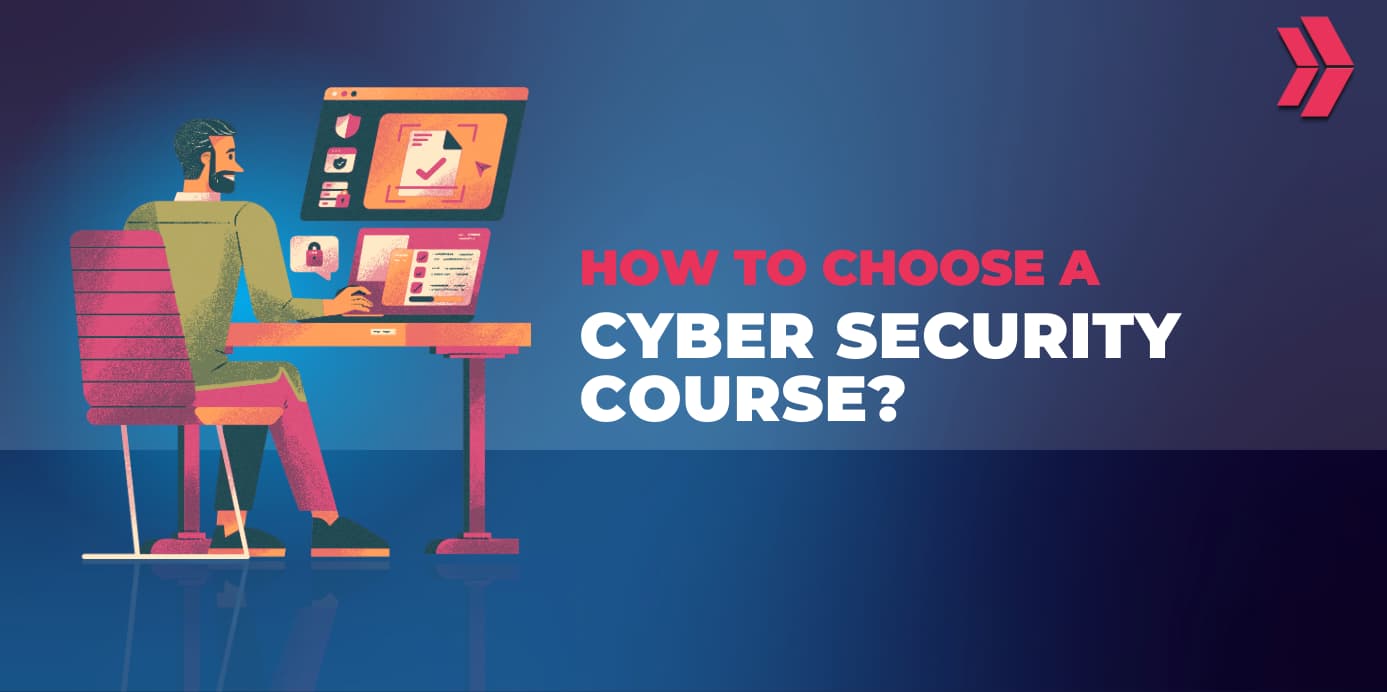As technology advances, cybercrime has grown at a breakneck pace. The global cost of cyber-attacks is expected to reach $793 billion per month and $9.5 trillion in total by the end of this year, according to Cybersecurity Ventures. Learning cyber security ensures the confidentiality, integrity, and availability of infrastructure and sensitive information.
Employing the technical and soft skills required for cyber security is essential to preempt and prevent security breaches. In response to the evolving threat landscape, individuals who acquire proper training through cyber security boot camps and obtain relevant cybersecurity certifications, combined with critical skills, will have a rewarding cybersecurity career.
This article delves into the top 7 high-demand cybersecurity skills, providing insights into how to learn, understand, and prepare for the challenges of cybersecurity jobs.
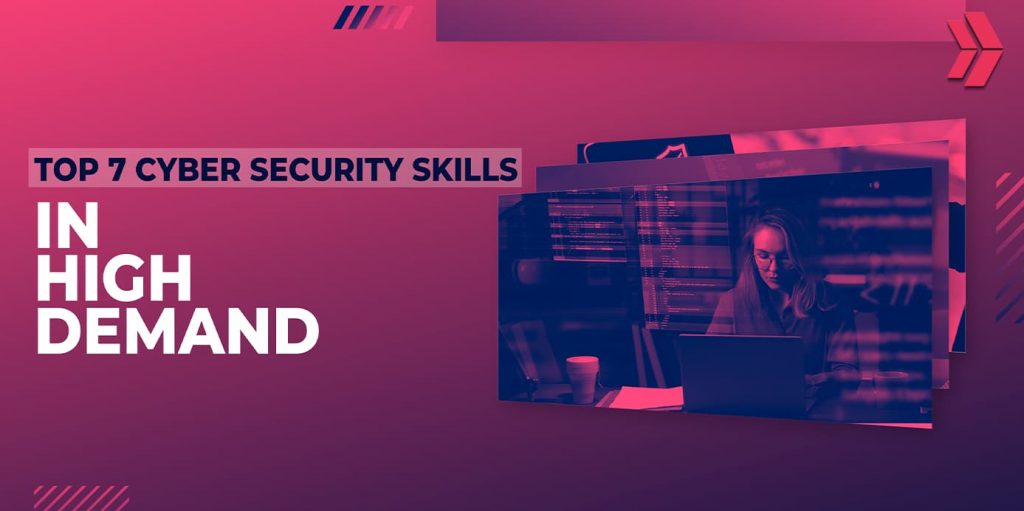
What are Cybersecurity Skills?
Cybersecurity skills encompass technical and soft skills needed to succeed in any cybersecurity career path. Technical abilities encompass practical knowledge and proficiency in various techniques and tools to accomplish cyber tasks. Similarly, soft skills needed for cyber security enable professionals to collaborate, adapt, and create innovative solutions to emerging problems.
What are the Top 7 Cybersecurity Skills in High Demand?
Cybersecurity professionals should have competent skills to identify and mitigate cyber threats. The technical skills required for cyber security combine theoretical and practical knowledge. Here are the top 7 cybersecurity skills in high demand:
- Virtual Machines and Operating Systems
- Risk Management
- System Administration and Network Security
- Threat Monitoring
- Digital Forensics and Incident Response (DFIR)
- Vulnerability Assessment and Pentesting
- Programming and Scripting Languages
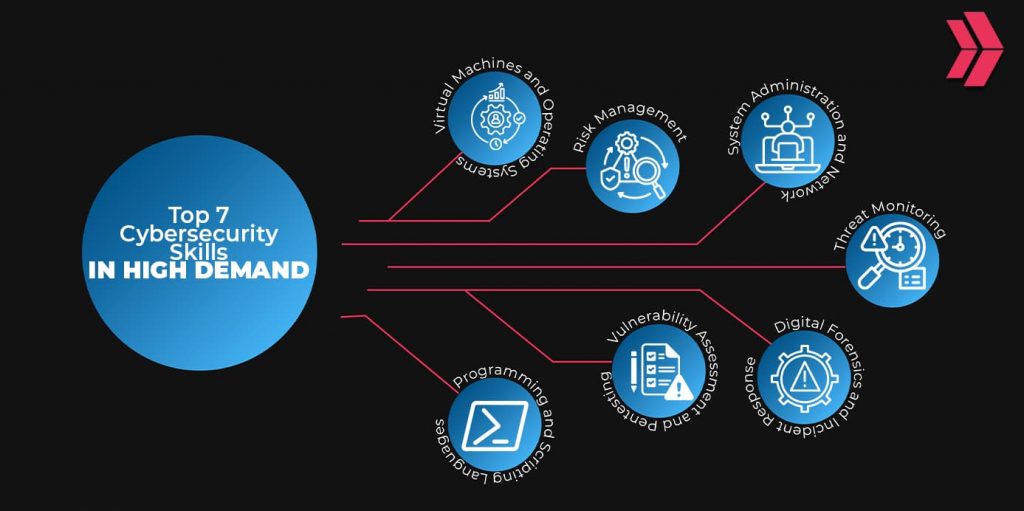
Virtual Machines and Operating systems
Virtual machines (VMs) are crucial for accessing tools and systems, conducting vulnerability assessments, and performing malware analysis. Additionally, a VM is an ideal testing environment without posing any risk to the host system.
A cybersecurity professional must comprehensively understand different operating systems. Learning about operating systems enables professionals to manage system resources and build a safe environment against potential threats.
Risk Management
Risk management is a systematic and complex process for identifying, analyzing, and mitigating risk factors. Effective risk management involves creating robust plans to minimize risks and evaluating the effectiveness of management efforts.
A comprehensive risk management approach necessitates continuously integrating risk assessment into the security strategy. Risk management strategies help organizations mitigate potential threats, ensuring business continuity and preserving their reputation.
System Administration and Network Security
System administration refers to configuring and maintaining systems to ensure data security and accessibility. System administrators manage an organization’s IT infrastructure to ensure its smooth functioning.
Network security is crucial for establishing and integrating secure network architectures to safeguard digital assets against unauthorized access or theft by utilizing networking technologies.
Threat Monitoring
Threat monitoring involves observing the existing systems for both internal and external threats. Continuous monitoring activities are crucial for gathering data from various access points to conduct comprehensive risk assessments and facilitate security operations.
Cybersecurity experts must monitor intrusion detections, analyze the events, and respond to incidents accordingly, ensuring the safety and security of the organizational system.
Digital Forensics and Incident Response (DFIR)
DFIR comprises 2 elements: first, digital forensics, which involves analyzing the root cause of an incident; second, incident response, which entails detecting, preventing, and recovering from security breaches.
DFIR provides 3 key benefits: evaluating the attack surface, identifying the root cause and recovery solutions, and preventing similar incidents from occurring again.
Vulnerability Assessment and Pentesting
A vulnerability assessment is an evaluation that identifies potential security threats and vulnerabilities to gain unauthorized access. Although used interchangeably, vulnerability assessment identifies gaps, while risk assessment evaluates threats, likelihood, and impact.
Penetration testing is a proactive method in which ethical hackers simulate cyber attacks to identify vulnerabilities in systems or networks. Pentesting helps develop robust defensive measures and prioritize security investments to keep organizations safe.
Programming and Scripting Languages
A fundamental understanding of programming and scripting languages is essential for cybersecurity success. One should familiarize oneself with coding languages to expand future cybersecurity opportunities.
Some cybersecurity tools require basic scripting to interpret attack procedures and manage events. Having this knowledge is vital for the optimal usage of such tools.
What are the Soft Skills Needed in Cybersecurity?
Individuals require more than just technical skills to thrive in today’s workplace. Employees must possess both technical and soft skills to succeed in their careers. Here are the top 7 soft skills needed for cyber security:
- Communication
- Adaptability
- Critical Thinking
- Creativity
- Collaboration
- Leadership
- Stress Management
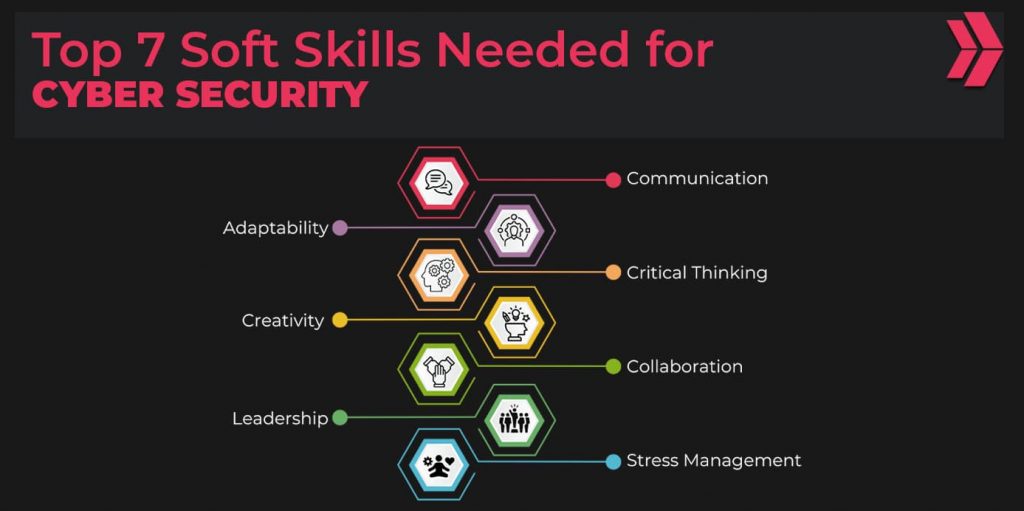
Communication
Effective communication is instrumental in the smooth functioning of daily business operations. Employers consider communication to be the most critical skill for a cybersecurity job, with a significant rate of 58%, according to the State of Cybersecurity 2023 Report by ISACA. Professionals must possess excellent communication skills to articulate job descriptions concisely and convey complex technical information to non-IT stakeholders with simplicity and clarity.
Adaptability
Adaptability is crucial in ensuring the security of networks and systems against constantly evolving threats and emerging technologies in cybersecurity. Security professionals must quickly learn new concepts and update security measures to improve practices and counter cyber threats. Agility enables individuals, procedures, and strategic plans to be adaptable to changing circumstances.
Critical Thinking
Professionals with critical thinking skills methodically diagnose problems, assess options, and select the best possible solution. They conduct thorough analysis and research throughout the entire process. Individuals with critical thinking skills possess observation, problem-solving, threat identification, and proactive strategy development abilities.
Creativity
Creative approaches and innovative methods can significantly enhance security efforts and prevent data breaches. Individuals who leverage creative problem-solving skills are highly sought after in cybersecurity. Integrating creative thinking into security efforts enables professionals to anticipate and recognize potential threats and devise innovative solutions to mitigate their harmful impacts.
Collaboration
Cybersecurity collaboration fosters healthy relationships across departments and organizations to mitigate cyber attacks and enhance security posture. It helps establish uniform communication standards and a shared language, facilitating the exchange of knowledge and expertise. Additionally, it enables faster detection and response to security incidents, minimizing the impact of security breaches.
Leadership
Leaders must take charge and set an example for others during challenging times by demonstrating expertise and making quick decisions to overcome difficult situations. Leaders must also ensure coherence among teammates and maintain employee morale. In addition, they should provide a suitable environment to feel comfortable and be productive.
Stress Management
Cybersecurity jobs can be stressful and require individuals to work under pressure. The ability to maintain self-control is crucial in managing stress. Furthermore, proper training and automation of repetitive tasks help to reduce anxiety levels. Additionally, taking short breaks is another effective way to manage stress.
What are the Advantages of Gaining Cybersecurity Skills?
Acquiring cybersecurity skills has become increasingly advantageous as cyber-attacks become more severe and frequent. The need for cybersecurity professionals is rising; 68% of organizations are at risk due to a shortage of cybersecurity skills, according to the 2023 Fortinet Cybersecurity Skills Gap Report. Therefore, individuals must gain cybersecurity skills to meet the market demands and contribute to safeguarding organizations against cyber threats.
How to Learn Cybersecurity Skills?
There are different options for learning cyber security. Pursuing a college degree in cybersecurity or a related discipline provides strong foundational knowledge for a career. Alternatively, bootcamps offer a more practical and focused curriculum, providing hands-on experience, mentorship, and career management services at a lower cost than the traditional education system. Moreover, certifications validate the skills for cyber security and contribute significantly to personal and professional development.
What Role Do Online Bootcamps Play in Learning Cybersecurity Skills?
Online bootcamps have emerged as a cost-effective, efficient, and reliable way of learning cybersecurity skills. Bootcamps offer a focused and immersive learning experience that helps individuals quickly develop essential skills required in the market. The short-term cyber security bootcamps provide students with comprehensive theoretical knowledge and hands-on experience, equipping them with an in-depth understanding of diverse domains to stand out among their peers.
What are the Essential Cybersecurity Certifications for a Career?
Cybersecurity certifications validate expertise and are valuable for career growth. Many types of certifications address the needs of various job roles. When selecting a certification, individuals should consider several factors, including the level of knowledge, area of expertise, and cost. CompTIA Security+, CISSP, GIAC, CISA, and CISM are the top 5 most sought-after cybersecurity certifications, according to Cyberseek 2024 Project.
What are the Cybersecurity Job Opportunities?
Cybersecurity presents a rewarding and dynamic career opportunity in 2024 and beyond. The demand for trained cybersecurity experts is increasing and is projected to surge by 32% by 2032, according to the U.S. Bureau of Labor Statistics. The cybersecurity field offers flexibility, remote work options, and attractive salaries. Cybersecurity analysts, penetration testers, security engineers, and cloud security specialists are among the most in-demand cybersecurity jobs.
What are the Requirements to Start a Cybersecurity Career?
Getting a proper education is essential to have a robust theoretical background. Certification is another component that validates expertise in the field, and practical experience strengthens the professional cybersecurity career. Networking and joining communities, groups, or events is also necessary to keep up with the latest trends and land a job quickly.
In conclusion, cybersecurity requires soft and technical skills to mitigate cyber threats successfully. There are considerable job vacancies in cybersecurity, and individuals who employ the required skills can succeed in any cybersecurity career path. Professionals combining education, certification, and hands-on experience will be indispensable for any organization and help create a resilient and secure environment.


